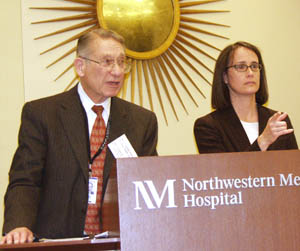Health Care Fraud Growing, Says Lisa Madigan
As attorney general of Illinois, Lisa Madigan serves as the “people’s lawyer,” protecting consumers from fraudulent practices, recovering restitution on their behalf, and educating them about emerging scams. So why was she the keynote speaker at the Buehler Center on Aging’s long-term care conference held May 22 at Northwestern Memorial Hospital?
As Madigan explained to the audience, health care, like any business, exposes consumers to potentially misleading and deceptive business practices. And seniors, who consume the bulk of health care services in this country, are the most vulnerable victims of crime—health care-related and otherwise. “The vast majority of consumer fraud is perpetrated against older people in our society,” explained Madigan, who was voted into office in 2002 and is the first woman to hold the position of attorney general in Illinois. “Since the attorney general’s office developed a health care bureau in 1998, we have fielded some 10,000 complaints related to health care issues.”
Denial of insurance benefits prompts many consumers to seek assistance from the attorney general’s office, whose mediators deal with a range of complaints from gross overcharging of medical services to difficulty accessing primary or specialty physicians. In 2005 the state agency successfully mediated 690 health care coverage complaints for consumers, saving them millions of dollars. “We strongly urge you to learn up front about your medical coverage and what to expect from it,” said Madigan.
She also touched upon the high cost of prescription drugs and how Illinois citizens can become better consumers of pharmaceutical products. “We conducted a study of pharmacies around the state, comparing drug pricing,” she shared. “As with gas or milk, we found that shopping around can potentially make a difference in the prices you pay for prescription drugs.”
Introduced last fall, the new federal drug benefit, Medicare Part D, has become another potential source of consumer fraud that Madigan’s office stands ready to combat for older Illinois residents. The office of the attorney general advises seniors to carefully consider and compare Medicare prescription drug plans before making any decisions and make sure they know the rules governing telemarketing, door-to-door solicitations, and e-mail offers. For example, telemarketers are not allowed to ask for personal identification or financial information. Plan providers cannot legally solicit door to door or send e-mail messages without permission from the consumer.
 On the topic of long-term care, Madigan discussed her work with the National Association of Attorneys General (NAAG) and its End-of-Life Health Care initiative. The project focuses on three principal areas of concern: providing adequate pain management, respecting the wishes of those nearing death, and ensuring competent end-of-life care. Attorneys general across the nation have become involved, at state as well as federal levels, to improve the care and dignity of the dying with the help of health care professionals such as Arnold L. Widen, MD ’53, GME ’59 (shown at left with Lisa Madigan). Associate professor of medicine at the Feinberg School of Medicine, Dr. Widen also serves as medical director for the Office of Illinois Attorney General.
On the topic of long-term care, Madigan discussed her work with the National Association of Attorneys General (NAAG) and its End-of-Life Health Care initiative. The project focuses on three principal areas of concern: providing adequate pain management, respecting the wishes of those nearing death, and ensuring competent end-of-life care. Attorneys general across the nation have become involved, at state as well as federal levels, to improve the care and dignity of the dying with the help of health care professionals such as Arnold L. Widen, MD ’53, GME ’59 (shown at left with Lisa Madigan). Associate professor of medicine at the Feinberg School of Medicine, Dr. Widen also serves as medical director for the Office of Illinois Attorney General.
Joining Madigan on the podium at the Buehler Center conference, Dr. Widen described the “chilling” effect of state and federal laws on physicians who prescribe pain-relieving drugs for end-of-life patients. “The problem in this country is not that pain cannot be relieved but that many of the major pain medications are derivatives of opioids, which are highly regulated substances,” said Dr. Widen. “Because of these regulations, physicians often won’t prescribe these drugs with the adequate dosage or frequency, even for the terminally ill, due to personal concerns about investigations or law enforcement actions.” A physician with many patients on pain medications, for example, could raise a red flag.
Dr. Widen stressed the importance of an awareness campaign about pain medication and gave an update on initiatives supported by the Office of Illinois Attorney General. “I am happy to tell you that our Illinois attorney general has joined other attorneys general in urging drug enforcement to provide a balanced approach to pain relief and the enforcement of these drugs,” he reported. Last December Madigan and 25 other attorneys general signed a letter sent to key policy makers urging national legislation on pain care policy, according to Dr. Widen.






